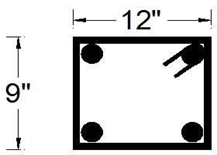In this article, we explained lap length, bend length and development length and hook length calculation
LAP LENGTH
How to Calculate Lap length?
The lap length is the overlap of the two rods, which
provides the required design length. In the RCC configuration, lapping is done
if the length of a bar is not sufficient to create the design length.
Lap length is the length provided to connect two rebars
to each other to securely transfer loads from one bar to another and instead
provide mechanical couplers
Suppose we want to build a building 15 m high. But 15m
single bar is not available in the market. The maximum length of steel
available in the market is usually 12m – 40feet, so you need to connect two
bars of 12m to get a 15m bar.
Each over-lap length = 50d (Practically)
Therefore, d = dia of bar
(over-lap length means Joining to the steel bar with extra
length of Steel bar)
Extra
Length = Over-Lap Length = Lapping Length
Theoretical Standards for Over-lap length:-
1. For Compressive member (vertical member) Standard
over-lap length = 40d (Vertical over-lap)
2. For Tensile member (Horizontal member)
Standard over-lap length = 50d (Horizontal
over-lap)
Problem-1: Find the length of steel bars including the over-lap length from the given beam below figure
Given
data:
Beam = Horizontal Member = 50d
Over-lap length Length of steel bar = 50d
We will use 12mm, 16mm and 20mm dia bars for the
calculation
Length = 6m
Solution:
Length of steel bar = Total length + over-lap length Length of steel bar = L + 50D
1. Length
of bar, if dia of bar = 12mm
12mm = 0.012m (12/1000 = 0.012)
= L + 50D = 6.0m + 50 x 0.012m = 6.60m
2. Length
of bar, if dia of bar = 16mm
16mm = 0.016m (16/1000 = 0.016)
= L + 50D = 6.0m + 50 x 0.016m = 6.80m
3. Length
of bar, if dia of bar = 20mm
20mm = 0.020m (20/1000 = 0.020)
= L + 50D = 6.0m + 50 x 0.020m = 7.00m
Must read: What is Lapping Zones for Column and Beam | lapping Zones
Problem-2: Find the length of steel bars including the over-lap length from the given Column below figure
Given
data:
Column = Vertical Member = 40d
Over-lap length Length of steel bar = 40d
We will use 12mm, 16mm and 20mm dia bars for the
calculation
Length = 20’
Solution:
Length of steel bar = Total length + over-lap length Length of steel bar = L + 40D
1. Length
of bar, if dia of bar = 12mm
12mm = 0.0393 feet
L + 40D = 20' + 40 x 0.0393' = 21.57200 feet (21 feet
655⁄64 inches)
2. Length
of bar, if dia of bar = 16mm
16mm = 0.0524 feet
= L + 40D = 20' + 50 x 0.0524' = 22.62 feet (22 feet
77⁄16 inches)
3. Length
of bar, if dia of bar = 20mm
16mm = 0.0656 feet
= L + 40D = 20' + 40 x 0.0656' = 22.62400 feet (22 feet
731⁄64 inches)
BEND LENGTH AND
DEVELOPMENT LENGTH
How to Calculate Bend Length and development of Bar?
When we bend the steel bar,
the length of the bar increases slightly as it is stretched in the bending area
(see image below). The length expansion depends on the quality of the steel and
the size of the bend.
The length of bar increases
when the increasing degree of bending increases and it decreases with higher
quality steel. (Fe250, Fe450, Fe500)
For 45° bend = 1d
For 90° bend = 2d
For 135° Bend = 3d
For 180° bend = 4
Bend
Length calculation:
Each Bend length = 16d (Practically) (development
length)
Therefore d = Dia of bar
Problem -1:
Find the length of steel bars including Bend length from
given the figure
Given
data:
Bend length = 16d
Length = 3m
We will use 12mm, 16mm and 20mm dia bars for the
calculation
Solution:
Length of steel bar = Total length + Bend length Length of steel bar = L + 16D
1. Length
of bar, if dia of bar = 12mm
12mm = 0.012m (12/1000 = 0.012)
= L + 50D = 3.0m + 16 x 0.012m = 3.192m
2. Length
of bar, if dia of bar = 16mm
16mm = 0.016m (16/1000 = 0.016)
= L + 50D = 3.0m + 16 x 0.016m = 3.256m
3. Length
of bar, if dia of bar = 20mm
20mm = 0.020m (20/1000 = 0.020)
= L + 50D = 3.0m + 16 x 0.020m = 3.32m
Problem -2:
Find the length of steel bars including Bend length from given the figure
Given
data:
Bend length = 16d
Length = 9’
We will use 12mm, 16mm and 20mm dia bars for the
calculation
Solution:
Length of steel bar = Total length + Bend length Length of steel bar = L + 16D
1. Length
of bar, if dia of bar = 12mm
12mm = 0.012m (12/1000 = 0.012)
= L + 16D = 9’ + 16 x 0.0393' = 9.6288 Ft
2. Length
of bar, if dia of bar = 16mm
16mm = 0.016m (16/1000 = 0.016)
= L + 16D = 9' + 16 x 0.0524' = 9.8384 feet (9 feet
101⁄16 inches)
3. Length
of bar, if dia of bar = 20mm
20mm = 0.020m (20/1000 = 0.020)
= L + 16D = 8.416' + 16 x 0.0656' = 9.4656 feet (9 feet
519⁄32 inches)
Lapping zone
Hook Length
How to calculate hook length for stirrups
What is Hook Length?
The hook is the extra length left at the rod joining corner of a stirrup so that the stirrup retains its shape.
Each Hook length
= 9D
Therefore, d = dia of bar
d = Diameter of stirrup
Total length of steel bar including Hook lengths = L +
9D + 9D = L+18D
Problem-1:
Find the length of Stirrup from the given figure if dia of
Stirrup = 6mm and 8mm
Given
data:
Length - 0.30m
Breadth – 0.40m
Length of Stirrup or tie = L + 18D
Solution: Ø = 6mm & 8mm for Stirrup or Tie
(i). Length of Stirrup or tie = L + 18D
Therefore, 'L' = ( L + B ) x 2
= (0.30+0.40) x 2 = 1.40m
Length of Stirrup or tie = 1.40 + 18 x 0 .006 = 1.508m
(ii).
Length of Stirrup or tie = L + 18D
Therefore, 'L' = ( L + B ) x 2
= (0.30+0.40) x 2 = 1.40m
Length of Stirrup or tie = 1.40 + 18 x 0 .008 = 1.544m
Must
read: How
To Calculate Cutting Length For Square Stirrups
Problem-2:
Find the length of Stirrup from the given figure if dia of
Stirrup = 6mm and 8mm
Given
data:
Length – 9”
Breadth – 12”
6mm = 0.236”
8mm = 0.314”
Total length (L) = Therefore 'L' = (L + B) x 2 =
(9" + 12") x 2 = 42"
Length
of Stirrup or tie = L + 18D
Solution: Ø = 6mm & 8mm for Stirrup or Tie
Length
of Stirrup or tie = L + 18D
Therefore, 'L' = (L + B) x 2
= 42"+18 x 0.236"
= 46.248"
= 46.248/12 = 3.854 Ft
Length
of Stirrup or tie = L + 18D
Therefore, 'L' = (L + B) x 2
= 42"+18 x 0.314” = 47.652”
= 47.652/12 = 3.971 Ft
Must
read: How
To Calculate The Quantity Of Steel In Column
Must
read: Minimum
Size of Concrete Slab, Beam & Column
FAQ
Why hook is provided in stirrups?
1. Hook
is provided in stirrups for the following reasons:
2. To avoid buckling of the column.
3. The
main requirement for protection against bond failure is that the steel provides a good extension of the bar length beyond where it is required to create
its yield stress, and this length must be at least equal to its growth length.
However, if the actual available length is not sufficient for total growth,
special anchors such as cogs or hooks or mechanical end plates should be
provided.
4. It resist
seismic movement.
5. To
prevent the concrete from cracking externally.
6. it
prevents the steel from slipping from the concrete.
7. Hold
the steel tight by positioning the long steel rods.
What is Lap Length?
The lap length is the overlap of the two rods, which
provides the required design length. In the RCC configuration, lapping is done
if the length of a bar is not sufficient to create the design length.
What Is Bend Length?
The bend deduction is the
difference between the bend allowance and twice the outside setback
The bend allowance is the
arc length of the bend as measured along the neutral axis of the material you
are using.
What Is the Lapping Length of Rebar?
1. For Compressive member (vertical
member) Standard over-lap length = 40d
(Vertical over-lap)
2. For Tensile member (Horizontal
member) Standard over-lap length = 50d
(Horizontal over-lap)
Must
read: Plain
Footing Quantity Survey | Volume Of Concrete | Area Of Shuttering | Area Of
Bitumen Paint
Must
read: Raft
footing Quantity Survey | Volume Of Concrete | Area Of Shuttering | Area Of
Bitumen Paint
Must
read: Step
footing Quantity Survey | Volume Of Concrete | Area Of Shuttering | Area Of
Bitumen Paint





















No comments:
Post a Comment